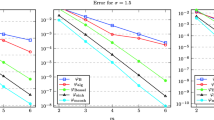Abstract
The asymptotic behavior of block floating-point and floating-point digital filters is analyzed. As a result, mantissa wordlength conditions are derived guaranteeing the absence of limit cycles in the regular dynamic range. Explicitly, the requirements are given for block floating-point state space filters with different quantization formats. Although these conditions are only sufficient, examples are given in which they are also necessary. In most cases the conditions are easily satisfied.
Similar content being viewed by others
References
P. Bauer, Absolute error bounds for block floating-point direct form digital filters,IEEE Trans. Signal Proc., 43(8):1994–1996, Aug. 1995.
P. Bauer and K. Ralev, A limit cycle suppressing arithmetic format for digital filters,IEEE Trans. Circ. Syst. I, to appear.
P. Bauer and J. Wang, Limit cycle bounds for floating-point implementation of second order recursive digital filters,IEEE Trans. Circ. Syst., 40(8):493–501, Aug. 1993.
S. Boyd and J. Doyle, Comparison of peak and RMS gains for discrete-time systems,Syst. Contr. Letters, 9(1):1–5, June 1987.
K. Kalliojärvi and J. Astola, Roundoff errors in block-floating-point systems,IEEE Trans. Signal Proc., 44:783–790, Apr. 1996.
T. Kaneko, Floating point oscillations in floating-point digital filters,IEEE Trans. Audio Electroacoust., AU-21(2):100–106, Apr. 1973.
T. Laakso and B. Zeng, Limit cycles in floating-point implementations of recursive filters—A review, inProc. ISCAS, pages 1816–1819, San Diego, CA, May 1992.
T. Laakso, B. Zeng, I. Hartimo, and Y. Neuvo, Elimination of limit cycles in floating-point implementations of recursive digital filters,IEEE Trans. Circ. Syst., II, 41(4):308–312, Apr. 1994.
J. L. Long and T. N. Trick, An absolute bound on limit cycles due to roundoff errors in digital filters,IEEE Trans. Audio Electroacoust., AU-21:27–30, Feb. 1973.
D. Mitra and J. R. Boddie, Limit cycles in floating-point digital filters, inProc. ISCAS, pages 374–377, Tokyo, Japan, 1979.
A. V. Oppenheim, Realization of digital filters using block floating-point arithmetic,IEEE Trans. Audio Electroacoust., 18(2):130–136, June 1970.
K. R. Ralev and P. H. Bauer, Asymptotic error bounds for block floating-point digital filters, inProc. 39th Midwest Symposium on Circuits and Systems, vol. 3, pages 1405–1408, Ames, IA, Aug. 1996.
K. R. Ralev and P. H. Bauer, Asymptotic error bounds for floating-point digital filters, inProc. 3rd International Conference on Electronics, Circuits, and Systems, pages 1239–1242, Rodos, Greece, Oct. 1996.
K. R. Ralev and P. H. Bauer, Implementation options for block floating-point digital filters, inProc. ICASSP-97, vol. 3, pages 2197–2200 Munich, Germany, 1997.
Author information
Authors and Affiliations
Rights and permissions
About this article
Cite this article
Ralev, K., Bauer, P. Asymptotic behavior of block floating-point digital filters. Circuits Systems and Signal Process 18, 75–84 (1999). https://doi.org/10.1007/BF01206546
Received:
Revised:
Issue Date:
DOI: https://doi.org/10.1007/BF01206546




